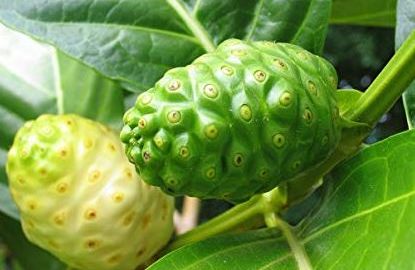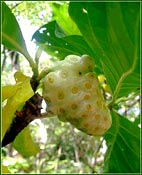
Description : The noni plant, native to Asia, Australia, and the islands of Polynesia, is a small, shrubby tree. The plant’s white flowers are tubular. The fruit is yellow-greenish-white in color and large, with a pebbled surface. The ripe fruit has a characteristic cheese-like, bad odor.
M. citrifolia, also called “noni” grows in shady forests, as well as on open rocky or sandy shores. It reaches maturity in about 18 months, then yields between 4 and 8 kg (8.8 and 17.6 lb) of fruit every month throughout the year. It is tolerant of saline soils, drought conditions, and secondary soils. It is therefore found in a wide variety of habitats: volcanic terrains, lava-strewn coasts, and clearings orlimestone outcrops, as well as in coralline atolls. It can grow up to 9 m (30 ft) tall, and has large, simple, dark green, shiny and deeply veined leaves.
The plant bears flowers and fruits all year round. The fruit is a multiple fruit that has a pungent odour when ripening, and is hence also known as cheese fruit or even vomit fruit. It is oval in shape and reaches 10–18 centimetres (3.9–7.1 in) size. At first green, the fruit turns yellow then almost white as it ripens. It contains many seeds. It is sometimes called starvation fruit. Despite its strong smell and bitter taste, the fruit is nevertheless eaten as a famine food and, in some Pacific islands, even a staple food, either raw or cooked. Southeast Asians and Australian Aborigines consume the fruit raw with salt or cook it with curry. The seeds are edible when roasted.
M. citrifolia is especially attractive to weaver ants, which make nests from the leaves of the tree. These ants protect the plant from some plant-parasitic insects. The smell of the fruit also attracts fruit bats, which aid in dispersing the seeds. A type of fruit fly, Drosophila sechellia, feeds exclusively on these fruits.
Uses : Hawaiian Noni is used for everything like joint pains, immune problems, pain relief, cellular regeneration and more. Noni fruit contains a number of enzymes (proteins) and alkaloids that are believed to play a pivotal role in good health. There are researches to conculde that Noni fruit stimulates the immune system, regulating cell function and cellular regeneration of damaged cells. It is particularly useful in supporting the nervous and structural systems (especially pain in joints) and for skin health. Noni has gained popularity with anecdotal evidence claiming that it is beneficial in fighting fatigue, depression, sexual dysfunction and arthritis. Noni Fruit is most well known for is the compound alkaloid proxeronine, which is believed to be a precursor to xeronine. Xeronine is an alkaloid, which is believed to activate dormant enzymes and support healthy cell function. This has further lead to the miraculous cures claimed by some people but Noni Fruit does have benefits that are beyond dispute. Noni Fruit is an excellent source of beneficial acids, Vitamin C and alkaloids.
Parts offered : Fruits, Leaves & roots on order
Health Benefits :
- Analgesic
- Immune system booste
- Antidepressant/sedative
- Skincare/hair
- Anti-tumor/anti-cancer
- Hypertension
- Cholesterol
- Memory
- Irritable Bowel Syndrome/constipation
- Antibacterial/antifungal/antiviral
Natural Extracts
|  |
| ||||||||||||||||||||

